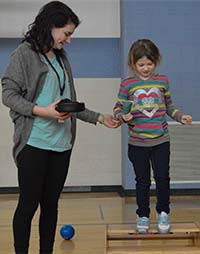More than a dozen teenagers and young children sat politely in a circle on the gym floor. Then came the craziness.
“Duck, duck, duck, duck …” said a boy, tapping each person’s head as he walked. “Goose!” The last tap landed on high school student Jacob Murray, who chased the boy around the circle — only to lose his seat, to squeals of laughter from the rest. It was a high point of a half-hour of fun and mutual enrichment between students from River Valley Academy, an alternative high school, and kindergartners in the autism spectrum disorder (ASD) program at nearby Parkside Elementary School.
Twice a week, up to eight River Valley students walk over to play games and pal around with the children with ASD. In so doing, they help sharpen the younger students’ awareness and motor skills, while receiving from them the joy of play and the blessings of giving.
For students at River Valley, most of whom have not had success in regular high school, the chance to help these little ones also helps them in their academic and personal challenges.
Katie Steffensen said it motivates her to come to school and improves her mood and focus in class.
“Not only is it taking some time to be able to be away from the school work and the stress there, but it’s being able to be around the kids and see how happy we make them,” said Katie, a junior.
Added junior Lexie Gould, “If I’m having a bad day, it cheers me up to see the kids. You can see how it makes them happy.”

Valuable Pairing
Parkside serves about 20 of the nearly 900 students with autism served in Kent ISD special-education programs. The school began its Peer to Peer program in the 2014-15 school year aided by the Statewide Autism Resources and Training (START) program at Grand Valley State University. GVSU’s Peer to Peer START Project helps schools set up programs aimed at giving students on the wide-ranging autism spectrum more access to general education and its students. While Peer to Peer programs between general and special-education students are increasingly common, this particular pairing offers a different blending – and bountiful benefits for both groups.
After last year pairing third- through fifth-grade ASD students with their mainstream peers, Parkside leaders wanted to expand services to younger pupils this year. Judging early elementary students were not equipped for the challenges involved, the school partnered this fall with River Valley, whose high school students went through training to work with kindergartners.
‘It’s unbelievable, the amount of interaction we get out of them versus when it’s just us.’ – Emily Molesta, Parkside teacher
The results have been “remarkable,” said Dawn Thorsen, a social worker for both schools. The Parkside pupils see models for how to act in the River Valley students, while the latter pick up on behavior patterns in the children that adults sometimes miss, Thorsen said.
“They bring a lot to the table with what they observe,” Thorsen said of the River Valley students, who meet with her monthly. That can lead to little successes, such as discovering a withdrawn child loves being dragged around on a scooter with a hula hoop, she noted.
The twice-weekly visits also have put a charge into the children through the sheer power of playing with older peers, said Emily Molesta, a kindergarten teacher in the autism program.
“It’s unbelievable, the amount of interaction we get out of them versus when it’s just us,” said Molesta, who previously oversaw a Peer to Peer program in Sparta. “They’re able to produce so much more. (River Valley students) can get them to interact and engage in ways that we can’t.”
The exercise also pays off in class for her pupils, she added: “This allows us to get the wiggles out, burn some energy, so they can go into the classroom and focus more.”

Contributing Has Benefits
The energy burn was on full display on a recent morning. Students ran back and forth under a colorful parachute, then huddled together underneath it like a tent.
“Want to tell ghost stories?” one student called out. They then played “popcorn” by shaking the parachute tolaunch balls into the air.
Katie Steffensen attentively guided Chloe Rehkopf over a series of overturned plastic buckets, then helped her drop a bean bag into a basket. “Let’s go do it again,” Katie gently urged the girl.
Jacob Murray whooped and laughed as he wheeled Jacob Rosario-Barrios around the gym floor with a hula hoop. The River Valley senior was there because he asked to be part of the program. He was only permitted to do so after meeting with Lisa Jacobs, River Valley’s executive director, and agreeing to improve his behavior, attendance and school work.
He said helping to raise a brother with Down syndrome influenced his desire to work with these children. “It’s just common sense to me, teaching these kids personal skills,” Jacob said. “I love kids.”
Katrina French, who babysits a cousin with autism, said she wants to help students progress in skills such as counting. “It’s a nice experience to see kids excel,” she said.
That opportunity to help, while improving their own school work in order to participate, has had a “reparative” effect on the River Valley students, some of whom struggle with their own problems, said Thorsen, their social worker.
“It’s a good opportunity for them to come and really shine, and they really do,” Thorsen said. “It brings out the best in them. Our kids with autism have really allowed those kids to be who they are.”
CONNECT









